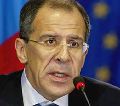Lavrov wants new European security treaty after Georgia conflict
New York -  Russian Foreign Minister Sergei Lavrov Saturday told the UN General Assembly that the European security infrastructure had failed in "recent events" and called for a new Europe-wide security treaty.
Russian Foreign Minister Sergei Lavrov Saturday told the UN General Assembly that the European security infrastructure had failed in "recent events" and called for a new Europe-wide security treaty.
Lavrov said that in the conflict in the Caucasus, the "existing architecture of security in Europe did not pass the strength test in recent events."
He said that it was impossible and even had disastrous consequences to try to solve the current problems with the blinders of a one-superpower world - an apparent reference to the United States' actions during the Georgian crisis.
Lavrov called for a new European security treaty that would be called "Helsinki 2" and be based on the legal framework of the UN charter to guarantee all states equal security.
Lavrov defended Russia's actions in Georgia, saying it had no other choice than to recognize the independence of South Ossetia and Abkhazia in order to protect the population there.
Russia invaded Georgia in August after Georgian President Mikheil Saakashvili sent troops into the disputed South Ossetia region. The invasion was sharply condemned by most Western nations and has led to a sharp deterioration in Russia's ties with the West.
Lavrov supported French President Nicolas Sarkozy's six-point plan for peace, charging that Tbilisi had caused concern with new attempts to manipulate the proposal to its own good.
Lavrov placed indirect blame on the United States for responsibility for the Caucasus crisis. He said the illegal invasion of Iraq by the US had given other states the feeling that they had a blank check to solve their problems using any means, referring to Goergia's handling of its two breakaway republics.
During the week of debate by world leaders at the annual UN session, the Georgian conflict was a regular topic.
Earlier in the week, Saakashvili called on the UN to condemn Russia's "brutal invasion" and help implement a ceasefire.
US President George W Bush called Russia's invasion a violation of the UN Charter and said the world "must stand united in our support of the people of Georgia."
Other countries which have at one time or another fallen under the umbrella of the former Soviet Union, also sharply condemned Russia's actions earlier in the week.
Polish President Lech Kaczynski said that talks on a closer partnership between the European Union and Russia should remain on hold at least until Russian troops completely leave Georgian territory, and possibly beyond.
Ukrainian President Viktor Yushchenko accused Russia of "hypocrisy" and "candid support of separatism" for recognizing the independence of both South Ossetia and Abkhazia soon after the invasion.
Estonian President Toomas Hendrik Ilves said that the UN's inability to act showed just how important it was to reform the UN Security Council, over which Russia holds a permanent veto along with the US, France, Britain and China.
Sarkozy appealed for calm and reached out to Russia, saying that Europe does not want war.
"We want to build a shared future with Russia. We want to be Russia's partner," he said.
Because neither Russian President Dmitry Medvedev nor Prime Minister Vladimir Putin travelled to New York for the annual UN gathering, Lavrov gave the Russian address on Saturday. (dpa)